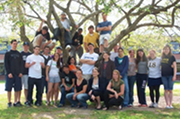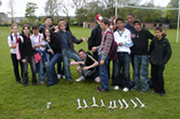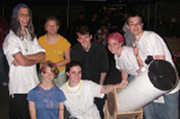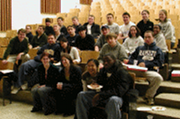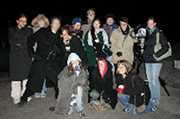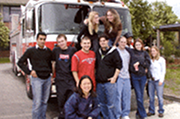I am currently an adjunct at Suffolk Law school, but for six years, I taught high school physics and astronomy both in the suburbs of Boston and the heart of Edinburgh. Although I am no longer in a science classroom, I still consider myself a science educator. You can find a bunch of science goodies in the right column and some suggested reading below, but I'd like to take this space to share my thoughts on the importance of science and science education.
When I took a Fulbright teacher exchange to Edinburgh, Scotland, I left behind an astronomy course I had created. At the request of my replacement, I wrote an open letter to the class answering the question "Why Astronomy?" It was intended as an introduction to the course. In reality, however, it was my answer to the general question, "why should everyone study science?" The highlights, however, come down to this: (1) it can save the world; (2) it keeps us honest; and (3) it is among the most human of activities--it is our birthright.
The letter started by recounting a conversation I had in college while manning an open house at the observatory. A visitor expressed her belief that investments in astronomy amounted to a waste. "Wouldn't we be better off taking care of problems here on earth before worrying about all this space stuff?" It was a fair question considering the expense of modern astronomy, and it is a question often asked of pure research in general. We no longer use the sun to tell time. The stars no longer signal the harvest, nor do we use them to navigate... I was tempted to talk about "spin-offs," perhaps mentioning the role of artificial satellites in everything from GPS to TV. However, a poster of the planets caught my eye, and there we sat between Venus and Mars--two cautionary tales that may yet save humanity.
I explained how studying the atmosphere of Mars helped alert us to the danger of nuclear winter. Since the inception of nuclear weapons, a protracted nuclear war had always threatened immense horrors, but before the discovery of nuclear winter, it wasn't clear that it could mean the end of the world. This realization helped drive much of the work done towards arms control in the latter half of the twentieth century. Likewise, the Venuasian atmosphere helped underline the danger of global climate change, offering an example of a runaway greenhouse effect. In this way, astronomy and pure research helped alert us to two of humanity's most pressing threats. It is not yet clear if these warnings will be enough to save humanity, but at least, we now know of the dangers that come with certain choices. In short, science can save the world.
This is a fine argument for why someone should study science, but it falls short of why everyone should. For that we have to dig deeper, and for my students in a public high school, it had to do with their preparation for entering the electorate. Shortly after 9/11, I noted anthrax improperly cited as a virus in two national news outlets. In the same reports the use of antibiotics was mentioned as a treatment, which is odd considering antibiotics don't kill viruses. When a panicked public is actually threatened by a viral pathogen, who wants to bet they demand antibiotics? It happens all the time with the flu--a viral infection. Yet patients still demand antibiotics. Such improper use can spur the development of drug resistant bacteria, a big problem for modern medicine. However, doctors have been known to prescribe unnecessary antibiotics. What if their patients went to someone else?
Maybe this doesn't seem like a big deal, but at the time of my letter, the US was funding the development of a missile defense "shield" for shooting down ballistic missiles from rogue states, despite the fact that the technology had never been proven and the obvious loophole that bombs don't have to be delivered via missile. Is this a question of antibiotics working on viruses, of politicians worried their constituents might vote for someone else? How can we tell? Who am I to say that they can't shoot down those missiles? It doesn't seem too hard. Heck we can land a man on the moon...
We live in a world deeply dependent on science and technology. As members of a deliberative democracy, we have a duty to help answer the questions that such a world presents. Science is not so much a collection of knowledge as a method for gaining it. The study of any science teaches you how to think. It hones your mental tool kit, strengthening a set of skills necessary not only for the continuance of the republic but for the betterment of your self-interest. It's good to put things to the test, and the same skills you use to question nature can be put to use buying a used car or picking a president. Admittedly, the misuse of science and technology are responsible for many of the problems of the modern world, but it is because of this that science is needed to help address them, and historically it has been the scientists themselves who have alerted us to the potential problems. The methods of science work to keep us honest. They're not perfect, but then again, we're only human.
So maybe you're willing to accept that on some practical level everyone should care about science. Sure, it's saved the world several times over, its methods can help us make decisions, and its tools can be used to hold those in power accountable, but it seems like going to the dentist or the gym--something that's "good for you" but not your first choice for fun. Some people even look upon science as dehumanizing. It places limits on what is and isn't possible; it reminds us that we can't always trust ourselves and that all the wishing in the world doesn't make something so.
This may seem at first an odd tangent, but consider for a moment what it is to be human. We could muse over this for ages, but I'm brought back to the work of Douglas Hofstadter, who sees the existence of self-reference and model making as key. The great discovery of astronomy is that the heavens and earth are made out of the same stuff. The only difference between a pile of simple elements and a person is the pattern. So how do we explain what makes us alive, what makes us human? One extreme suggests that we cannot, that life is the realm of the divine and that we are ensouled with something we can never hope to understand, something different in kind from normal matter. The other extreme posits that we are nothing more than the collective interactions of innumerable atoms. Both fall short of experience, either ignoring the input of experimental evidence or the verisimilitude of the human condition. Hofstadter's concern is consciousness, and his answer is deceptively simple and a tad reminiscent of Descartes. To over simplify, a conscious entity is one who models the world in which it lives and who finds it necessary in constructing these models to postulate the existence of self. If you're really interested, you should check out his Pulitzer winning work Godel, Escher, Bach. However, what's important for us is that such a definition puts model making at the center of consciousness, and it is consciousness which separates us for other collections of atoms.
What is science if not the explicit construction, evaluation, and application of descriptive and predictive models of our world? The undertaking of science is inescapably human. Along with the production of emotive models of the world (art), science is humanity made tangible. Scientific thinking may save the world, it may make modern technology and societies possible, it may provide an essential component for democratic governance, but more than anything, it is your birthright.
---
It's clear to anyone who has read much Sagan that I am a big fan of his writing. I hear it echoing in the words above, and it should come as no suprise that Sagan was actually required reading in my astronomy class, specifically The Demon-Haunted World. I've included links to this and a few other texts below. I hope you find them useful.
Also, you can find some articles about my time as an educator here, and occasionally, a blog post about education here.
Suggested Reading
- The Demon-Haunted World: Science as a Candle in the Dark
- A great introduction to the importance of science and critical thought in society. In fact, this book was required reading in the astronomy class I used to teach.
- The Inflationary Universe
- This book recounts the discovery of Inflationary Theory in a very human and accessible way. The concepts can be a little hard to grasp, however. So for my students I made this list of reading questions to help act as an aid. I hope you like it and the book.
- Six Easy Pieces: Essentials of Physics By Its Most Brilliant Teacher
- I often get emails asking for a book to serve as a good introduction to physics. For those who want something more than a general pass, I suggest this.
- Six Not-So-Easy Pieces: Einstein's Relativity, Symmetry, And Space-Time
- The companion to Six Easy Pieces.
- Workbook Physics: Mechanics 2nd Edition
- One of the reasons I enjoyed teaching so much was because of my talented colleagues. This book was written by two of the best and served as the backbone of our Mechanics unit at Lexington High School.
- QED: The Strange Theory of Light and Matter (Princeton Science Library)
- If you're already a student of physics, and you just want something that will blow your mind, this is the book. Seriously.
- Godel, Escher, Bach: An Eternal Golden Braid
- Musings on consciousness. I only include this link here because I mentioned it in my argument above for why everyone should study science.
You might also like to click through to an archival version of our class blog, The Starry Messenger, or pictures from the 2003-04 building of our Dobsonian Telescope.
An intermittent video series presenting answers to science questions, brief lessons, and ideas for teachers & students.
An app that helps solve common introductory mechanics problems, consider it training wheels for learning mechanics.
An on-line tool and database for running quiz bowl practice rounds in accordance with National Science Bowl rules.
Phylm, pronounced "film," is a portmanteau combining physics and film and the umbrella name given to a number of physics/film projects I've worked on, including a Phylm Prize, and a curricular unit for physics teachers.
My first byline, Moving Targets is a Hot Science piece I wrote while interning for NOVA Online, the companion site to PBS's NOVA. It explains how to measure the radial velocities of stars.
